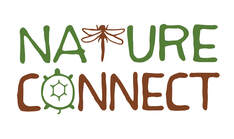Why do we learn like this?
Primarily, we seek to encourage strong connections to the land, self, and others.
Here's the forest school teaching and learning philosophy in Canada in a nutshell:
Forest school practitioners carefully observe interactions and interests of the children in their group, which helps them to tailor sessions appropriately (through a continuous cycle of planning, observation, adaptation, and review).
In addition to the forest school philosophy, Nature Connect has been influenced and inspired by many individuals and groups, such as:
Here's the forest school teaching and learning philosophy in Canada in a nutshell:
- long-term, repeated time spent in the same wooded or natural environment to support the development of a relationship between the child and the natural environment (at least 2.5 hours per week for at least 10 weeks)
- child-led, inquiry-based learning, where the curriculum planning is "upside-down" (plans seek to address interests rather than "cover" curriculum)
- centring Indigenous ways of knowing, teaching, and learning
- opportunities for supported risk-taking, appropriate to the child and the environment
- wholistic development, fostering creative, independent, confident, and resilient learners
Forest school practitioners carefully observe interactions and interests of the children in their group, which helps them to tailor sessions appropriately (through a continuous cycle of planning, observation, adaptation, and review).
In addition to the forest school philosophy, Nature Connect has been influenced and inspired by many individuals and groups, such as:
- Indigenous land-based pedagogies, ways of being on the land, ways of knowing, learning, and teaching here on Turtle Island
- forest school traditions in Scandinavia, Germany, and the UK
- Paulo Freire - teachers should not act as "bankers" who make "deposits" into children's brains, but education is a dialogical process full of new discovery, where teacher and student co-create
- Reggio Emilia approach - children have "100 languages" with which they can communicate and learn; the classroom environment is the "3rd teacher", project-based learning
- Howard Gardner - each person has multiple intelligences that help them to learn and synthesize new information
- Rudolph Steiner/Waldorf education - wholistic education (heart, hands, head) inspires a love of learning
- Lev Vygotsky - practitioners observe a child to assess the "zone of proximal development" where a child can reach new skill levels, if given the "scaffolds" to get there

